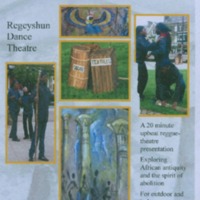
Sugar Beat Skank
Sugar Beat Skank was a reggae-theatre performance presented by Regeyshun Dance and commissioned by the Leeds Bicentenary Transformation Project. It explored 'African antiquity and the spirit of abolition', and gave voice to narratives linking the histories and cultures of Africa and Yorkshire. Sugar Beat Skank was performed at outdoor and indoor events across Yorkshire, including Ilkley Literature Festival in 2007.
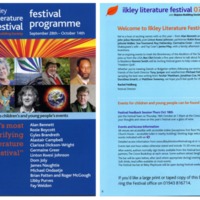
Ilkley Literature Festival, 2007
A number of events to mark the bicentenary of the Abolition Act of 1807 took place as part of Ilkley Literature Festival in 2007. Authors Caryl Phillips and Ben Okri discussed their work, and writers from the Peepal Tree Press Freedom Project premiered their poetry. 2007 Poet in Residence Rommi Smith invited festival goers to help create a unique literary 'Freedom Quilt', and gave a multi-media performance drawing on her recent visit to the Gambia. Street theatre was provided by performances of Sugar Beat Skank by Regeyshun Dance and the Leeds Bi-centenary Transformation Project. Members of the Leeds Diasporian Stories Research Group shared new material uncovered in the course of their research into the links between Yorkshire and the Atlantic trading world, and actor Joe Williams performed and answered questions as the African abolitionist Olaudah Equiano.
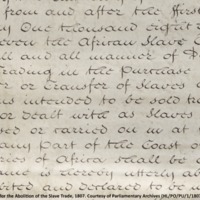
Heartbeat Riddim Chant
The dance-theatre production Heartbeat Riddim Chant was based on the horrors of the transatlantic slave trade. The production premiered at the West Yorkshire Playhouse in Leeds in July 2007, and mixed dance, live music and voice, including traditional Caribbean folk dancing blended with contemporary reggae. The show was choreographed by David Hamilton, and featured dancers from Regeyshun Dance and members of the community dance group Back Bone. There were also performances from youth dance groups and young voices from across Leeds, including LS7 Result, Northern School of Contemporary Dance, Gee4orce and Leeds Young Authors.
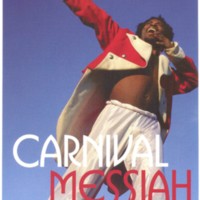
Carnival Messiah at Harewood
2007 saw a number of different projects taking place at Harewood House in West Yorkshire, home of the Lascelles family. The bicentenary was used as an opportunity to explore the family connections with the transatlantic slave trade and the sugar plantations of the West Indies.
To spotlight Harewood House's historic links with the Caribbean and carnival, in September 2007 a production of Carnival Messiah was held in a Big Top in the grounds. Carnival Messiah is a reinvention of George Frideric Handel’s oratorio Messiah as carnival theatre and heritage experience. The West Indian celebration features dancers, singers, masqueraders, musicians and actors. Stories from the Caribbean folk tradition, medieval mystery plays and African ritual combine with contemporary popular music and dance styles, including gospel, calypso, reggae, jazz, hop hop, bhangra and steel band. Geraldine Connor was Creator and Artistic Director and David Lascelles of Harewood House was Executive Producer. A community education and outreach programme ran alongside the project.
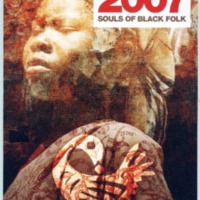
Black History Season Leicester 2007: Souls of Black Folk
Leicester's Black History Season in October-November 2007 marked the bicentenary of the abolition of the slave trade. Its aim was to redress the balance from a 'Eurocentric point of view' of abolition, and focus on the Afrikan perspective with the theme of 'Souls of Black Folk'. Musical performances included gospel, Motown, reggae and jazz. Other events in venues across Leicester and Loughborough included traditional South African dance, contemporary dance, performance poetry, comedy, multimedia performances, storytelling, theatre and an exhibition, 'Africa's Gift', focusing on the economic and cultural contributions of the slaves and their descendants.
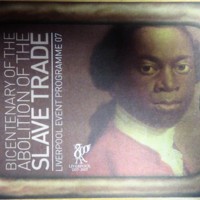
Liverpool Event Programme 07
Liverpool hosted a city-wide programme of activities and projects to commemorate the bicentenary, as part of events to mark the city's 800th birthday. The events aimed to celebrate the African Diaspora and support works by artists of African descent. They included: LEAP, an annual contemporary dance festival featuring African dance companies; a performance of Mighty Diamonds - Reggae Legends at the Philharmonic Hall; the Roscoe Lectures; the Brouhaha International Carnival, celebrating resistance, rebellion and abolition; the Africa Oyé Music Festival at Sefton Park; the Bound exhibition at Open Eye Gallery, showing works representing personal perspectives on the physical and psychological impact of slavery on humanity; and many other lectures and debates. There was also a slavery trail around the city.
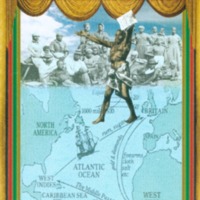
Leeds Bicentenary Transformation Project
This collaborative community initiative celebrated African and Caribbean culture in Leeds, with a focus on commemorating the Abolition Act by 'highlighting African achievement, liberation and aspirations'. New exhibitions, publications and resources were produced and over 100 bicentenary events organised under different themes: Education and Museums; Arts and Carnival Culture; Churches and Abolition; Legacy; Black History and Community Development; Media and Communications. Highlights included the photographic exhibition and pamphlet 'From Abolition to Commonwealth', which remembered indentured labour in Africa and the Caribbean after 1807, and the 40th anniversary of Leeds West Indian Carnival, with themes that highlighted heritage, liberation, respect and freedom. Project outputs included an education pack, black history classes, concerts, church services, lectures and performances.